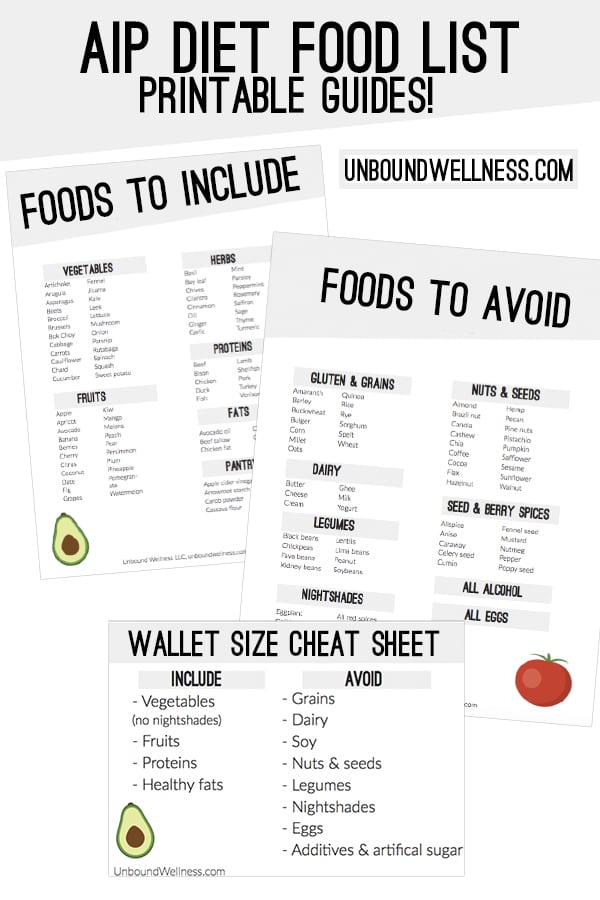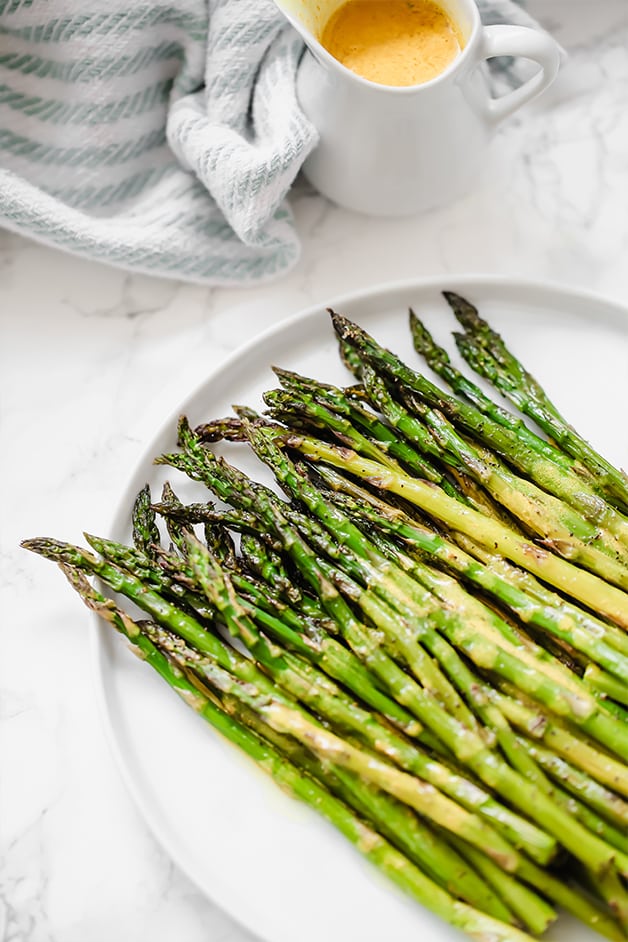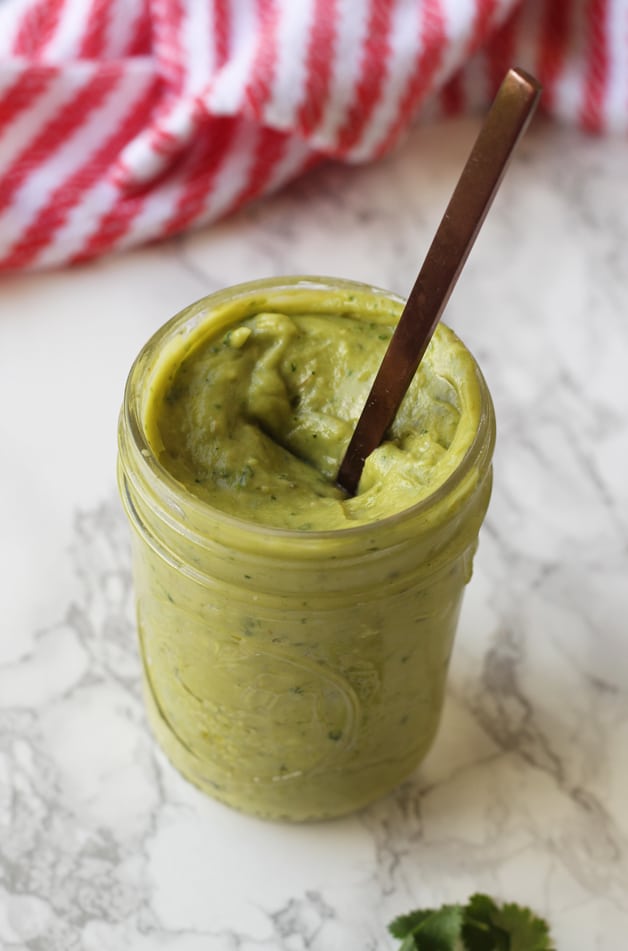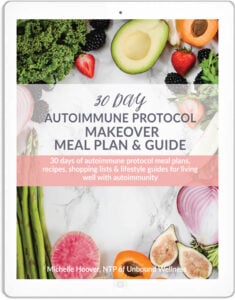AIP Diet Food List (With a Free Printable PDF!)
When I first heard about the Autoimmune Protocol (or AIP) diet, I felt the same way that most do… overwhelmed! What the heck was okay to eat? What wasn’t allowed? I have tons of AIP recipes on my blog, and now I’m excited to be sharing a complete AIP diet food list along with printable PDF guides, and explanations as to why certain foods are and are not compliant.

First, what is the AIP diet?
The autoimmune protocol diet is designed to lower inflammation to allow the body to heal. It’s meant to be a short-term protocol to allow inflammation to reduce while healing autoimmune disease. You can read a full guide to the autoimmune protocol here!
Does the AIP diet work for everyone that has an autoimmune disease? No. Does it help many? Yes!
There are so many other factors in healing autoimmune disease rather than just diet alone, such as addressing infections and imbalances, sleep, stress reduction, movement, lifestyle changes, and more. We can’t expect diet alone to heal everything.
However, food has a powerful impact that cannot be denied. In this blog post, we’re going to be focusing specifically on the foods that are allowed and not allowed on the autoimmune protocol, and a brief explanation as to why.
And for quick reference, I’ve also included PDF printable guides to take along with you and even fit in your wallet!
Click to Download the Printable Guide
Foods Allowed on the AIP Diet
Vegetables
Why they’re important …
Both vegetables and herbs are rich in phytonutrients, and fiber that allow our bodies to thrive! Though the AIP diet still included animal protein, it’s still highly plant-centric as it suggests up to 9 servings of vegetables a day.
Here are the vegetables that are allowed…
- Artichoke
- Arugula
- Asparagus
- Avocado
- Beets
- Broccoli
- Brussels
- Bok Choy
- Cabbage
- Carrots
- Cauliflower
- Chard
- Cucumber
- Fennel
- Jicama
- Kale
- Leek
- Lettuce
- Mushroom
- Onion
- Parsnip
- Rutabaga
- Spinach
- Squash
- Sweet potato
Get the asparagus recipe pictured below.
Herbs & spices
- Basil
- Bay leaf
- Chives
- Cilantro
- Cinnamon
- Dill
- Ginger
- Garlic
- Mint
- Parsley
- Peppermint
- Rosemary
- Saffron
- Sage
- Thyme
- Turmeric
Fruits
Why they’re important …
Fruits are fiber-rich and many contain antioxidants that protect the cells from damage. It’s recommended to not overdo fruit and to stick to around two servings a day.
- Apple
- Apricot
- Avocado
- Banana
- Berries
- Cherry
- Citrus
- Coconut
- Date
- Fig
- Grape
- Kiwi
- Mango
- Melons
- Peach
- Pear
- Persimmon
- Plum
- Pineapple
- Pomegranate
- Watermelon
Proteins
Why they’re important …
High-quality animal protein provides us minerals, healthy fats, and much-needed energy. Animal protein is highly debated, but the AIP diet advocates for animal protein as a healing food. High-quality choices like grass-fed, pasture-raised and wild-caught are preferred when possible, but do the best you can!
- Beef
- Bison
- Bone broth & organ meats
- Chicken
- Duck
- Fish
- Lamb
- Shellfish
- Pork
- Turkey
- Venison
Fats
Why they’re important …
Healthy fats regulate the inflammation process in our body, act as a carrier for nutrients, and allow us to stay satiated! Healthy fats are incredibly important to include at every meal to keep you full, and keep your body on a healing path.
- Avocado oil
- Beef tallow
- Chicken fat
- Coconut oil
- Olive oil
- Palm oil
Click to get the cilantro avocado lime sauce recipe pictured below.
Pantry Staples
- Apple cider vinegar
- Arrowroot starch
- Carob powder
- Cassava flour
- Coconut flour
- Coconut sugar
- Dried fruit
- Honey
- Tapioca starch
- Tigernut flour
Foods Not Allowed on the AIP Diet
Gluten & Grains
Why they’re not compliant…
Those suffering from autoimmunity are also dealing with some level of intestinal permeability. Gluten and grains can promote intestinal permeability (or a leaky gut) and are best avoided while you’re trying to allow the body to heal.
- Amaranth
- Barley
- Buckwheat
- Bulger
- Corn
- Millet
- Oat
- Quinoa
- Rice
- Rye
- Sorghum
- Spelt
- Wheat
Dairy
Why it’s not compliant…
Dairy can impact the integrity of the gut lining and stimulate allergies and inflammation. High quality dairy may be fine in moderation for some after healing, but it’s avoided during the AIP diet.
- Butter
- Cheese
- Cream
- Ghee
- Milk
- Yogurt
Legumes
Why it’s not compliant…
Legumes like beans can be damaging to the gut lining and are best avoided while trying to heal.
- Black beans
- Chickpeas
- Fava beans
- Kidney beans
- Lentils
- Lima beans
- Peanuts
- Soybeans
Nightshades
Why it’s not allowed…
Nightshade vegetables can trigger inflammation, especially in those with joint issues.
- Eggplant
- Goji Berries
- Ground cherries (not regular cherries)
- All peppers (spicy peppers, bell peppers, etc.)
- All red spices
- Potato
- Tomato
- Tomatillo
Nuts & Seeds
Why it’s not compliant…
Nuts and seeds (and seed spices below) can be inflammatory to the gut lining. These are often safely reintroduced when they’re properly soaked and sprouted.
- Almond
- Brazil nut
- Canola
- Cashew
- Chia
- Coffee
- Cocoa
- Flax
- Hazelnut
- Hemp
- Pecan
- Pine nuts
- Pistachio
- Pumpkin
- Safflower
- Sesame
- Sunflower
- Walnut
Seed & berry spices
- Allspice
- Anise
- Caraway
- Celery seed
- Cumin
- Fennel seed
- Mustard
- Nutmeg
- Black Pepper
- Poppy Seeds
All Alcohol
Why it’s not compliant…
Alcohol just doesn’t promote healing. It may be enjoyed in moderation after healing has taken place.
All eggs
Why it’s not compliant…
Eggs are one of the most common allergens and can irritate the gut. Yolks are less irritating than whites, and many are able to reintroduce yolks more easily than whole eggs.
All additives and sugar
Why it’s not compliant…
Additives like gums, food dyes, and sugars don’t promote healing. Natural sugars like honey, maple syrup, and coconut sugar are fine in moderation.
Is this all overwhelming? Grab my wallet size cheat sheet!
Okay, that was a lot. Even those that have been in the AIP community for years still question some of the nitty-gritty when it comes to what is and is not compliant. You don’t have to memorize this list front and back!
If you’re just starting out with an AIP diet and just need the high-level basics, I have a cute little baby wallet-sized cheat sheet for you to stash in your purse or pocket.
Download the wallet-sized cheat sheet here!
Get more support for putting meals together…
My blog is packed with tons of recipes for the AIP diet to make all of this easier! However, it can still hard to put into practice…
That’s why I created my guide the 30-Day Autoimmune Makeover! It’s an easy to follow 30-day guide focused on making over your lifestyle with autoimmunity that includes lifestyle recommendations, 30 days of meal plans, shopping lists, easy and delicious AIP recipes! Get your copy here!
Remember… it’s not all about food.
Again, food is important, but it’s not everything. Stress, lifestyle, sleep, and more are all important factors for healing. Be sure to stay tuned for more about healing autoimmunity, and check out my podcast for tons of other helpful info 🙂





I was diagnosed with rheumatoid arthritis and I can’t wait to start this diet. Hoping for the best! THANK YOU SO MUCH!
So glad you found Unbound Wellness!!
This AIP diet food list is super helpful! I appreciate the free printable PDF too—perfect for meal planning. Can’t wait to try some of these recipes. Thanks for sharing!
Hi there! Thank you so much, so glad you’re enjoying them!
thank you so so much, this is an amazing resource. I’ve struggled with hashimotos for a few years and am currently pregnant despite my thyroid levels being insanely out of wack. I’ve always known food plays an important role in our bodies, but never looked at really changing my lifestyle to help my body. I am ready now, all of this information made this actually attainable. I cannot thank you enough. I’m going to start my AIP journey and I am very excited to see the changes.
Good luck!!
Thank you for making this a bit easier and not so overwhelming!
Thank you! Good luck!!
I have thyroid issues the meds are addressing. I am going to try AIP to see if Iit helps.
Grazie mille! Nn vedo l’ora di cominciare
Enjoy!
Just beginning my journey
Sending love on your AIP journey!!
Finally found a comprehensive AIP diet plan. Thanks so much Michelle!.
Thank you so much!!
I noticed that one of the recipes calls for bacon. What about the additives (preservatives)? Should you look for bacon without these added?
I like using Applegate bacon!